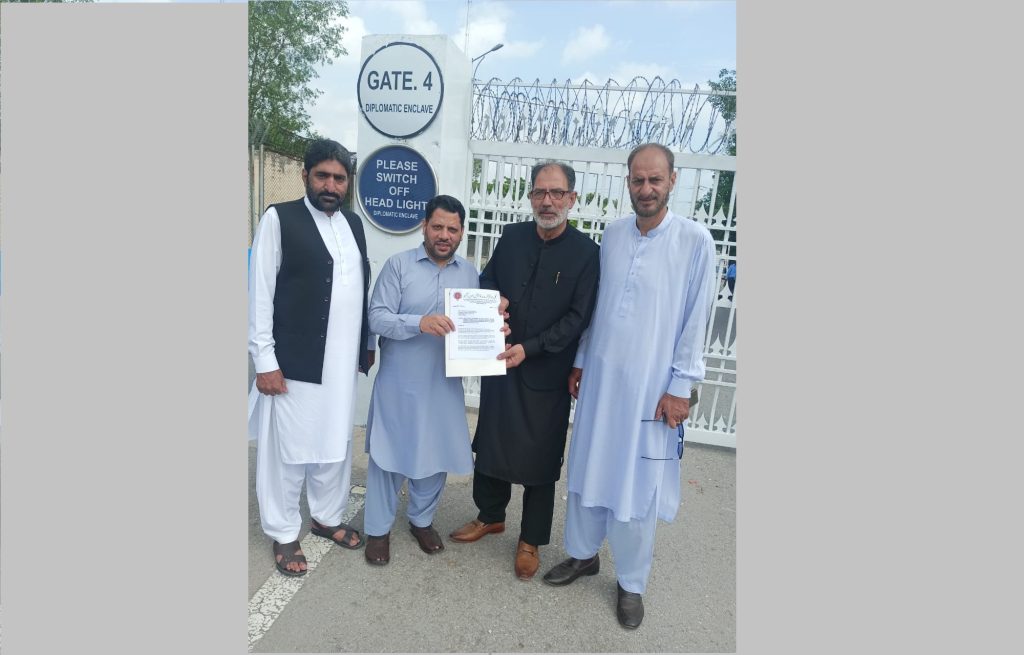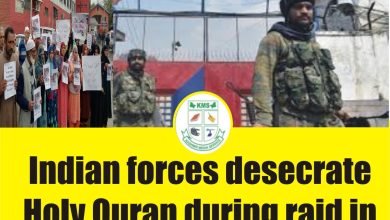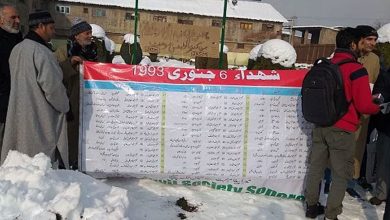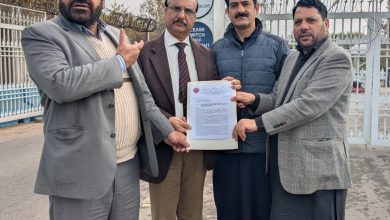APHC-AJK submits memorandum to United Nations office
 Islamabad: All Parties Hurriyat Conference Azad Jammu and Kashmir (APHC-AJK) chapter on the occasion of Istehsal-e-Youm-e-Kashmir submitted a memorandum to the United Nations office urging its General Secretary Antonio Guterres to facilitate a just, peaceful and durable solution of the Jammu and Kashmir dispute.
Islamabad: All Parties Hurriyat Conference Azad Jammu and Kashmir (APHC-AJK) chapter on the occasion of Istehsal-e-Youm-e-Kashmir submitted a memorandum to the United Nations office urging its General Secretary Antonio Guterres to facilitate a just, peaceful and durable solution of the Jammu and Kashmir dispute.
According to Kashmir Media Service, following is the full text of the memorandum
“To: Secretary-General of the United Nations
From: All Parties Hurriyat Conference (
APHC)Date: August 5, 2024
Subject: Urgent Appeal Regarding the Situation in Occupied Jammu and Kashmir: Five Years of Disempowerment and Human Rights Violations
Excellency
The All Parties Hurriyat Conference (APHC) respectfully submits this memorandum to your good self through the representative of Military Observer Group to highlight the grave situation in occupied Jammu and Kashmir since August 5, 2019.
The unilateral abrogation of the region’s special status has led to the disempowerment, discrediting, and dismemberment of the rights of the people of Jammu and Kashmir. This document outlines the legal, military, and human rights dimensions of the ongoing crisis, including recent changes to domicile laws, civil service structures, gerrymandering of assembly segments, and the alarming trend of surveillance and arrests of human rights defenders and political leaders.
Background
On August 5, 2019, the Government of India revoked Article 370 and 35/A of the Indian Constitution, which granted special autonomy to occupied Jammu and Kashmir. This drastic measure has resulted in widespread disenfranchisement of the local population, undermining their political, social, and economic rights. The subsequent changes to domicile laws and civil service structures have further exacerbated the situation.
Legal Implications
The abrogation of Article 370 and 35/A has raised significant legal concerns regarding the status of occupied Jammu and Kashmir. The unilateral actions taken by the Indian government contravene international law and United Nations Security Council resolutions regarding the right to self-determination for the people of Jammu and Kashmir. The introduction of new domicile laws, which allow non-residents to settle in the region and claim rights to jobs and land, poses a direct threat to the demographic and cultural identity of the local population.
Military Situation
The military presence in Jammu and Kashmir has intensified since August 2019, with an increased deployment of armed forces and security personnel. This militarization has resulted in a climate of fear and intimidation among the local population. Reports of arbitrary detentions, enforced disappearances, and extrajudicial killings have become alarmingly common. The use of excessive force against peaceful protests and dissent has drawn widespread condemnation from human rights organizations.
Human Rights Violations
The human rights situation in Jammu and Kashmir has deteriorated significantly, characterized by:
1. Surveillance and Intimidation: The local population, including human rights defenders and political leaders, faces constant surveillance and intimidation. The use of technology for monitoring and tracking individuals has created an oppressive environment.
2. Arrests of Human Rights Defenders: Many human rights activists and political leaders have been arrested under dubious charges, often invoking counter-terrorism laws that are misused to silence dissent and suppress legitimate political expression.
3. Gerrymandering of Assembly Segments: The redrawing of assembly segments to favor certain political interests undermines the democratic process and disenfranchises the local electorate. This manipulation of electoral boundaries is designed to dilute the representation of the indigenous population.
4. Disruption of Civil Services: The restructuring of civil services to favor individuals from outside the region further marginalizes local talent and expertise, eroding the sense of ownership and governance among the people of Jammu and Kashmir.
5. Systematic Discrimination: The cumulative effect of these policies is a systematic attempt to discredit and disempower the local population, denying them their rights and aspirations.
Conclusion and Call to Action
The situation in Jammu and Kashmir demands urgent attention from the international community. The All Parties Hurriyat Conference calls upon the United Nations to:
1. Investigate Human Rights Violations: Establish an independent commission to investigate the human rights abuses occurring in Jammu and Kashmir and ensure accountability for those responsible.
2. Reaffirm the Right to Self-Determination: Reiterate the commitment of the United Nations to uphold the right to self-determination for the people of Jammu and Kashmir, as enshrined in international law.
3. Facilitate Dialogue: Encourage inclusive dialogue among all stakeholders, including representatives from Jammu and Kashmir, to address the political and humanitarian crises in the region.
4. Monitor the Situation: Deploy a United Nations observer mission to monitor the human rights situation and provide regular reports on developments in Jammu and Kashmir.
The All Parties Hurriyat Conference urges the Secretary-General and the United Nations to take decisive action to address the ongoing crisis and uphold the rights and dignity of the people of Jammu and Kashmir.”
Sincerely
All Parties Hurriyat Conference.








